
It’s been my observation that so many women who have Hashimoto’s or hypothyroidism often report symptoms of random shoulder pain. I’ve experienced the problem personally a few times and at one point started to wonder if there could be a link between shoulder pain and Hashimoto’s.
Guess what? There is!
My Hashimoto’s and Shoulder Pain Story
During the years of my long Hashimoto’s journey of being misdiagnosed, there was a period of about 6 months when I struggled with excruciating shoulder pain. It interrupted sleep, driving, travel and basically robbed my joy. I saw several specialists including orthopedists, neurosurgeons, and physical therapists. I was prescribed oral steroids, antidepressants and trigger point injections (tossed the antidepressant prescription in the trash). I had an MRI and other tests which did not reveal anything structurally wrong.
Relief from the one round of trigger point injections (ouch!) was such a relief and I slept like a baby for the first time in quite a while.
But those benefits only lasted 24 hours and the smack-down pain returned with a vengeance, and I gained 20 pounds from the steroids.
Eventually, the cycle of pain stopped, but it was sort of by accident. After having surgery to remove fibroids, the pain that radiated from my shoulder and was about to drive me nuts somehow disappeared, literally the next day. My doctors believed it was some sort of paradox that happened as a result of anesthesia.
Whatever it was, I was grateful!
Two years ago I started experiencing mystery shoulder pain again. This time it was in the opposite shoulder and there wasn’t any obvious cause, no rhyme or reason as to why it was happening. I’m in good shape and always do some form of exercise every day and stretch afterward.
The pain was so acute and disruptive that I decided to see an orthopedist right away. The pain was a level 10+ and I wanted to rule out an injury or some other problem. I was prepared and armed emotionally to be told it was “part of getting older,” or “part of being a woman.” I heard all that nonsense in my 20s when no one could diagnose autoimmune thyroid disease. Beware of those types of explanations for symptoms.
By the time I saw the doctor my shoulder was completely rigid and “locked up.” I couldn’t raise my arm above shoulder level, I wasn’t sleeping AT ALL because the pain was worse at night or when lying down. I couldn’t exercise either… blood flow pumping through the muscles of my shoulder triggered intense pain.
Without any testing to speak of other than an x-ray, the diagnosis was adhesive capsulitis, also known as a primary frozen shoulder. The doctor also said I must have surgery right away because it wouldn’t heal otherwise. In came the surgery scheduler, and out the door I went.
I left his office not believing a word he said. Deep down I believed surgery was unnecessary and probably wouldn’t do any good. I didn’t even believe I really had primary frozen shoulder! I’m not saying he was looking for reasons to do surgery because in his best judgment based on my physical symptoms it was all he knew to offer. After all, he is a surgeon…and surgeons are in the business of doing surgery.
My first inclination was that it was somehow autoimmune related but I wasn’t sure how. Immediately I sought the help of a soft-tissue therapist and the work of a trainer in Valencia, California. They both taught me exercises I could do at home and promised that if this was not true frozen shoulder, the exercises and soft tissue therapy would help.
Within six weeks my shoulder pain was cured and it has not returned, albeit I keep up the exercises for maintenance. When I returned to the orthopedic doctor, he was in disbelief and wanted to know what I had done to heal. He was particularly shocked in that I hadn’t lost any range of motion. With a frozen shoulder, there are limitations in range of motion even after recovery from surgery or physical therapy.
At the end of our appointment, he commented that it was “probably due to inflammatory cytokines” despite there was no injury to my shoulder. It was also during that appointment that he told me most women with thyroid disease have shoulder pain, but he had no idea why.
My last appointment with my doctor was as close as I could get to him discussing, recognizing or admitting to a possible thyroid or immune system connection.
I work with women all the time who also have a thyroid condition and have gone through something similar with their shoulder…many have experienced it in both or the pain goes from one to the other. Several have accepted their surgeon’s advice and followed through with surgery only to recover and then continue to experience random acute to chronic shoulder pain episodes again. Many say the pain returned with a vengeance…more painful than it was before surgery.
So, what’s the connection between thyroid disease, Hashimoto’s and shoulder pain?
Why would inflammatory immune system cells congregate at the shoulder joint when there is no injury if that is what’s happening?
Hashimoto’s and Shoulder Pain Research
One research study reviewed “calcific tendinitis” and found it to be a common condition in women who have abnormal function of the thyroid gland. It was also found that people who have “diabetes or a genetic predisposition” may also be at risk for this type of mystery shoulder pain.
Below are symptoms of calcific tendinitis:
- Severe, disabling pain in the shoulder which occurs without cause.
- The pain often occurs in the morning, but not always.
- Stiffness in the shoulder – which leads the physician to assume frozen shoulder based on the overall clinical picture.
- Significant sleep disruption due to pain.
- Reduced range of motion.
- Limited activities of daily living due to pain.
Interestingly enough, the researchers in this study found that most cases resolve spontaneously without surgery.
This study done in Taiwan studied patients with hyperthyroidism as a risk factor for developing actual primary frozen shoulder.
I’ll never know if my case of healing was the result of soft tissue therapy and specific range or motion exercises or if it was spontaneous healing. Maybe it was a coincidence. I’m glad I did do therapy, however, because it certainly relaxed me and gave me a sense of hope in that I felt I was on the right path in a positive proactive way, whereas surgery would have been the wrong way to go for me.
What You Can Do
If you are experiencing or have experienced sudden shoulder pain as described in this article, I do recommend that you see a doctor to rule out a structural problem with the joint itself and surrounding tissues.
Also, make sure your Free T3, Free T4, and vitamin D levels are optimal. At the time of my last shoulder episode, my FT3 and vitamin D levels had dropped. As I was going through therapy I also increased my thyroid hormone dose and vitamin D intake slightly.
From there, you can always try what I did…a conservative approach and seek the help of a soft tissue therapist and trainer skilled in working with women who have shoulder problems. What you definitely want to avoid is “rigorous physical therapy,” the kind where they use aggressive and sometimes painful techniques. If your pain is related to your thyroid, painful therapy is the wrong approach for you.
More than likely it isn’t a true frozen shoulder and aggressive approaches will make you feel worse, and you’ll be very unhappy.
Give this some time before making the decision to have surgery because it may not help at all and if it does help it may only be temporary.
I also found that using Inflammatone, an anti-inflammatory agent which is safe for Hashimoto’s and doesn’t suppress the mucosal lining of the GI tract (but does offer support for oxidative stress) to be very helpful. I used it daily for 4 months.
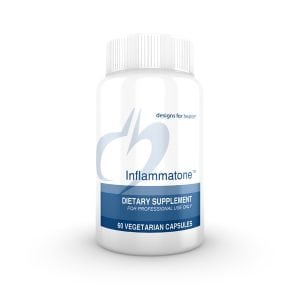
At Home Exercises
Try these at home with the approval of your therapist. These are my personal favorites and they really helped me a lot. You can also do them in the shower.
Helpful Tips
- Standing close to a wall or inside the shower against the wall with your arm extended and using your fingers to “crawl up the wall” is incredible for relieving shoulder pain. Warm water helps you get through the discomfort of this exercise.
- Also, try using a foam roller and lay on it so that the length runs with your spine and you can lay your neck and head comfortably on the roller. Relax, and while holding your arms up, slowly (like tin soldiers) allow your elbows down toward the floor. Your painful shoulder will resist but over time it will get better. I used yoga blocks at first instead of trying to get my elbow to the floor. Try deep breathing during this one because it helps the muscles relax.
- Be sure to avoid using a pillow during sleep. This was a challenge for me but is important. Instead, use a rolled up towel placed down the length of your spine and between your shoulder blades will help more than you can imagine.
- Essential oils like wintergreen, Frankincense, lemongrass, and peppermint do help a lot with inflammation, pain, and relaxation.
References:
- Carli, A. D. (2014). Calcific tendinitis of the shoulder. Joints Jts, doi:10.11138/jts/2014.2.3.130
-
Huang, S., Lin, J., Wang, W., Wu, C., Liou, T., & Lin, H. (2014). Hyperthyroidism is a Risk Factor for Developing Adhesive Capsulitis of the Shoulder: A Nationwide Longitudinal Population-Based Study. Sci. Rep. Scientific Reports, 4 doi:10.1038/srep04183

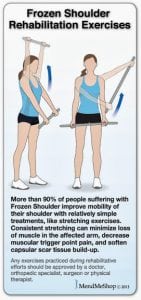
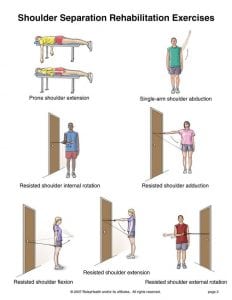
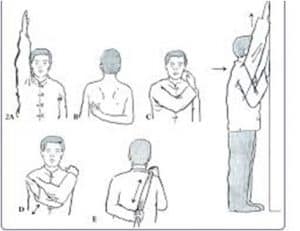



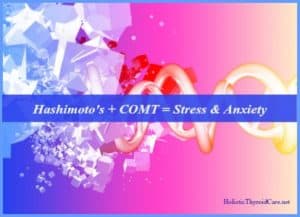
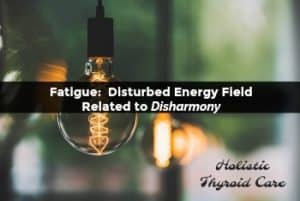
I also am currently suffering from this. It will wake me up in the middle of the night. Horrible radiating pain down to my finger tips!!
Shoulder pain and shoulder muscle pain is related to gallbladder, pancreas and liver which is common among autoimmune patients. I have hashis and am currently suffering from right shoulder muscle pain and right abdominal pain and it’s a result of my body attacking other organs now(despite living a completely organic, gluten free, clean, paleo life). So yes, it’s true what you found on the link between diabetes and shoulder pain because when the pancreas is badly damaged that’s when diabetes kicks in and patients experience pain. It’s all so bizarre. But anyone with hashimotos or any autoimmune disease PLEASE get your liver and gallbladder checked asap.
I had frozen shoulder twice and I do have hypothyroid for last 15 years. Luckily in my case my doctor was able to diagnose that it was frozen shoulder. It was so stiff even my doctor could not move my shoulder. Most of my pain appeared at night, I could not sleep without painkiller. So basically I was on ibuprofen for almost little more than a year. After 6 years it was the other side. Since I knew the symptoms I started my exercises from the very beginning this one (right side) took 8-9 months to heal. I still don’t have complete range of motion but almost there. Unfortunately people with diabetes and thyroid get frozen shoulder.
Thanks
Vanita
Thank you so much for this article. I too have pain in my right shoulder that won’t seem to go away. I know my thyroid levels are not optimal though. My FT4 is maybe around the 35-40% of the normal range and my FT3 is right at the bottom or below the lower end of normal. My endocrinologist won’t treat me because my TSH is around 0.5 and he will not prescribe T3 by itself. My TPO antibodies are at about 110. What do you consider to be optimal thyroid levels? Thanks!
Dr. Eric Berg in his youtube lessons is speaking many times about shoulder pain, esp. right shoulder pain
linking it to gallbladder issues. That’s interesting because of the fact that liver is changing T4 to T3.
Thus if sg is wrong in the liver or/and gallbladder can affect thyroid as well as the right shoulder.
Have noticed that. He recommends minimize nuts or soaking them overnight and only to use good type fats,
ACV, bitters, dandelion, kale, etc. No sugar of course, or white flours or SAD. Very good advice found there.
Thanks for the strecthing advice.
Maija
I too had frozen shoulder out of the blue. That was followed with hypothyroidism and then Hashimotos.
Wow, I am sitting here rubbing my very sore left shoulder. I even have nerve involvement where I will wake up in the middle of the night with one or both arm completely numb. Ugh. I know I have Hashimoto’s but unfortunately, my level are “within normal limits” and my doctor refuses to do anything beyond giving me selenium. Thank you for posting this. At least I can prove it’s not just me.
My pain is sciatica like symptoms in my hip and leg pain. I have hashimotos and degenerative disc disease I lower back. Any orthopedic looks at the x-rays and quickly says I need an injection in the disc. My PT disagrees and says it’s si joint dysfunction. Neither make a connection to my thyroid disease. Right. Ow I can’t walk or sit without pain but not sure what direction to take.
Hi Terry,
Thank you for leaving a comment. I understand your pain! It’s important to address oxidative stress in autoimmune thyroid disease (Hashimoto’s and Graves disease) as well as nutrient deficiencies and consider an anti-inflammatory diet based on unique food sensitivities (per testing). Collagen protein found in bone broth is also helpful for bone health.
Hope this helps and I wish you all the best on your journey.
Im 24 and recently diagnosed but have had joint pain in my neck and shoulders for years. My neck will feel extremely tight and like I need to crack it. Could It be from Hashimoto’s
Ask your doctor to draw a CRP level. It shows the level of inflammation through out the body. Also request a cortisol level. They are both helpful in evaluating your symptoms,
2 surgeries to right shoulder -1st one to rejoin tendon with a screw -2nd one March just gone by to snip frayed ligament. Pain level currently still intense. 2 local anesthetic jabs -All to no avail. Due another jab this coming week from the front -last one in from the back.total mystery MRI SHOWED nothing concrete.
I have intense pain in my sternum area -i have to sleep with a cushion tugged between my breasts so that my shoulders are supported and dont slump down adding pressure to this area. Sore to cough breathe hic up pain 24/7
Intense pain in my right hip – cant sleep on that side too long. Painful to turn over in bed – I sleep with a cushion tucked under my top knee to try and keep my body at one level.(when sleeping on either side) Battling at the moment with the illiac nerve(not sure of spelling) in my right groin – pinching all the time makes walking very painful.
Was diagnosed with Chrons Disease March last year -lost a lot of weight almost 15kgs
I am a 65 year old female.
I also have Hashimoto’s and had frozen shoulder and did tons of physical therapy which was good but didn’t really change anything for about 5 months before I had a routine TSH checkup which was WAY off. My doctor freaked out and adjusted my levothyroxin and within a month my shoulder started getting better. But then, my TSH went too far the other direction after another month or so, and my shoulder got worse again (but not as bad). After another change of my meds which finally balanced out my TSH, my shoulder totally resolved. I wonder how many others have tracked their TSH while having frozen shoulder.
I also had 2 frozen shoulders (both sides) and what I researched because of the hormone change… I also have Hashi what I found out after my shoulder issues. With my shoulders I had more than 10 + pains, nerve pains my shoulders are totally blocked down without motions. My doctor told me if I have 1 frozen shoulder I will have 100 % chance to come back on the other shoulder in 2-3 years what happened with me. Usually attacking white women 40 years + or older, he doesn’t know why probably the hormone changes? Right now I have a radiated side neck pains (from my left ear to down going to my shoulder side), coming and goes but I have a hard time to tolerate. My shoulders needed 1 year of PT to resolve, for both sides.
Is the pain limited to shoulders? Could this affect hips and beyond? Maybe joints in general? I was diagnosed with Hashimoto’a disease initially then had thyroidectomy when they found I had thyroid cancer. My hips kill me. PT has made the pain worse. Injections are short lived. Have others had join paint beyond the shoulders?
I suffered a similar fate but recently read that hypothyroidism goes hand-in-hand with vitamins B deficiency. Not sure hoe true that is but tried a multivitamin/calcium/magnesium supplement. On my third month now and my shoulder and muscle pain is almost entirely gone.
I was just diagnosed with hashi, and for several months I’ve been dealing with shoulder pain in my right arm very severe pain, not able to sleep, do normal activities, can’t exercise. I’ve been having xrays was getting ready to get MRI but now I seen this article I’m not sure I need that done. Thank you for this very informational artical.
Hi Dawn, thank you for visiting and leaving a comment. Shoulder pain is a common occurrence for people with Hashimoto’s thyroiditis. It’s related to “inflammatory cytokines” which are molecules from the immune system. I always recommend ruling out a functional problem (fracture, dislocation, etc.) and if such is confirmed not to be the case, it’s worthwhile to consider following the recommendations in the article. In the case of shoulder pain not related to an injury, fracture, dislocation, etc., it’s often misdiagnosed as primary frozen shoulder and surgery is usually recommended. However, if the pain is caused by inflammatory cytokines, surgery will not help and it certainly won’t prevent it from happening again. Some doctors are aware of the connection to thyroid disease and others are not. I hope the article is helpful for you and that you get some relief soon. It can take a couple of months to reverse the symptoms but it’s much easier than surgery that may not have been necessary. Always discuss the details with your orthopedist and make sure there is or is not a functional problem (injury, tear, fracture, dislocation, etc) before considering surgery as the only option. Take care!
OMG..I nearly cried when I found your article. Three years ago, my body had an explosion. I had never experienced anything like it. Tremors, slight Bells Palsy, loss of taste, goiter, severe brain fog, and more. Blood tests at the time revealed pre-diabetes and elevated thyroid levels. Levels weren’t off enough for medication and follow up blood work showed normal levels. Now, three years later, the one constant irritation is tendinitis, and presently, frozen shoulder with a lot of pain and little sleep. I have a new job, so as soon as I get my benefits, I am going to see an endocrinologist. My youngest daughter has hashimotos. She may get that from….me.
Thank you Terrie for sharing your health journey! I appreciate you leaving a comment.
Many don’t make the connection between shoulder pain and Hashimoto’s.
Wishing you and your daughter good health!
Take care.
I have had the shoulder pain that you speak about in this post, but I haven’t had it in awhile. I do have tremendous pain that runs across my top half of my back. It puts me down and it’s hard for me to get anything done. Could this be the same problem?
I was diagnosed about 4 months ago with Hashimotos. I’m on a AIP diet which has been a God send, but still have this bad pain in my upper back.
Thank You so much for the information that you share
Eva Garcia
I’m so glad I came across this. Have been experiencing shoulder pain and hip pain occasionally. On some days it’s so untriggered as I hadn’t carried anything heavy. Was thinking of visiting an orthopedic just to help me figure it out,but,this makes so much sense now.
I am having my thyroid gland removed tomorrow due to suspicious nodules
They doubled and 1 tripled in size in 6 months
About a month ago I started waking up due to severe shoulder pain, pain
Pill didn’t even touch it. My Dr prescribed a compound cream for it,
$180 for 90 pumps of the cream……not good, not covered by ins. Or
Good RX but I am gladly going to use it
My surgeon suspects cancer and said he does not believe I have
Hashimotos
I am very nervous about the surgery
I was so interested to come across this because the shoulder pan
Is excruciating